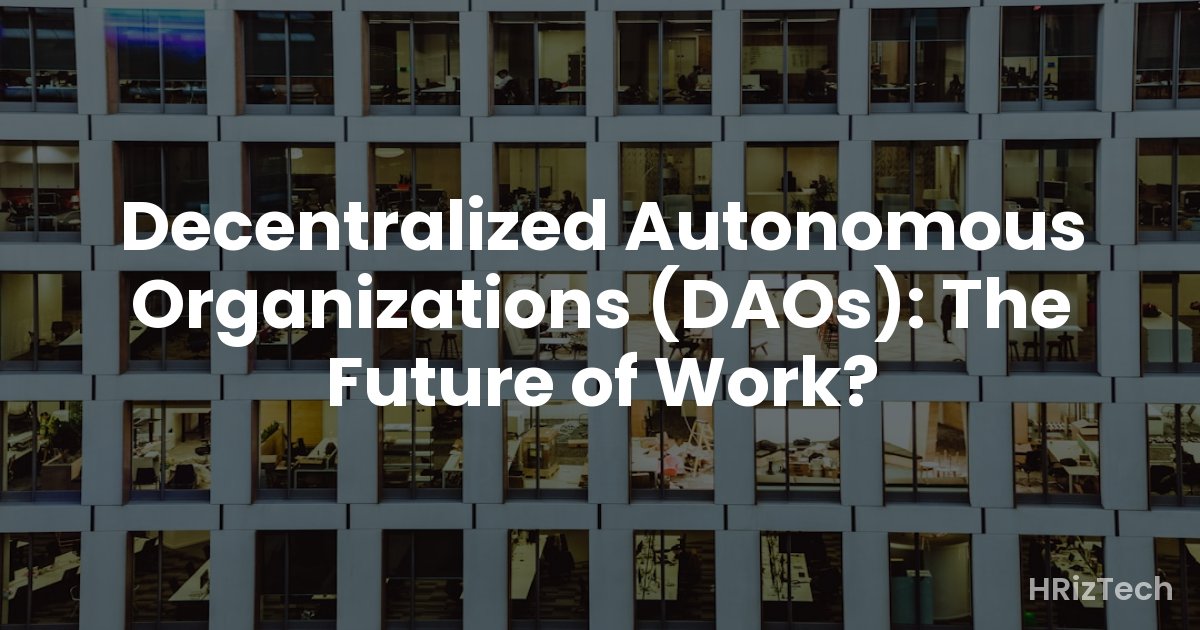Decentralized Autonomous Organizations (DAOs): The Future of Work?

Decentralized Autonomous Organizations (DAOs): The Future of Work?
- DAOs operate on blockchain technology, fostering transparency and trust.
- Tokenized governance allows for direct member participation in decision-making.
- DAOs offer flexibility and global reach, transcending geographical limitations.
- Challenges include regulatory uncertainty, scalability issues, and security concerns.
- The future of DAOs hinges on addressing these challenges and fostering widespread adoption.
What Exactly *Is* a DAO?
Forget the rigid hierarchies of traditional corporations. Decentralized Autonomous Organizations (DAOs) are shaking up the world of work with a radically different approach. Imagine an organization governed not by a CEO or board of directors, but by its own members, all operating on a transparent, immutable blockchain. That's the essence of a DAO. Decisions are made through proposals and voting, often weighted by the number of tokens a member holds, creating a system of distributed governance. This isn't just some futuristic fantasy; DAOs are already making waves across various industries, from finance and art to gaming and philanthropy.
The Allure of Decentralization
Why the sudden surge in interest in DAOs? The answer lies in their inherent advantages. Transparency is paramount. All transactions and decisions are recorded on the blockchain, providing an auditable trail for everyone to see. This fosters trust and accountability, reducing the risk of corruption and mismanagement often associated with centralized structures. Furthermore, DAOs are borderless. Members can participate from anywhere in the world, fostering a truly global and diverse workforce. The flexibility offered by DAOs is another key draw. Members can participate on their own terms, contributing as much or as little time and effort as they desire, making it an attractive option for those seeking work-life balance or seeking projects aligning with their passions.
How DAOs Function: A Deeper Dive
Tokenized Governance
At the heart of every DAO lies its governance token. These tokens represent ownership and voting rights within the organization. Members holding more tokens generally have a greater influence on decision-making. This system ensures that the organization's direction aligns with the collective will of its members. The specifics of token distribution and voting mechanisms vary significantly between DAOs, reflecting the diverse nature of these organizations.
Smart Contracts: The Engine of Automation
Smart contracts are self-executing contracts with the terms of the agreement directly written into lines of code. They automate many aspects of DAO operations, such as distributing funds, managing memberships, and executing agreements. This automation streamlines processes and reduces the need for intermediaries, enhancing efficiency and reducing costs.
The DAO Treasury: Collective Ownership
DAOs typically maintain a treasury of funds, often held in cryptocurrency. These funds are used to finance the organization's operations, reward contributors, and pursue its goals. The management of the treasury is often subject to community governance, ensuring that funds are used responsibly and in alignment with the DAO's mission.
Challenges and Hurdles
Despite their potential, DAOs are not without their challenges. Regulatory uncertainty remains a significant hurdle. The legal framework surrounding DAOs is still evolving, leading to ambiguity and potential legal risks for participants. Scalability is another concern. As DAOs grow, managing a large number of members and transactions can become complex and inefficient. Security is also a critical issue. DAOs are vulnerable to hacking and exploits, especially if security measures are not robustly implemented. Furthermore, the technical expertise required to participate in a DAO can be a barrier to entry for some individuals.
The Future of Work: A DAO-Driven Landscape?
The question of whether DAOs will become the future of work is complex. While the advantages are compelling, the challenges are substantial. Addressing these challenges – particularly regulatory uncertainty and scalability – will be crucial for widespread adoption. However, the inherent flexibility, transparency, and global reach of DAOs make them a compelling alternative to traditional organizational structures. As the technology matures and regulatory frameworks evolve, we can expect to see an increasing number of DAOs emerge, potentially reshaping the landscape of work as we know it.
Key Takeaways
- DAOs offer a decentralized, transparent, and flexible alternative to traditional organizations.
- Tokenized governance and smart contracts are core components of DAO functionality.
- Challenges include regulatory uncertainty, scalability, and security risks.
- The future of DAOs will depend on overcoming these challenges and fostering wider adoption.
So, what are your thoughts? Do you see DAOs as a viable future for work, or are the challenges insurmountable? Share your predictions in the comments below!
Comments
No comments yet. Be the first to comment!